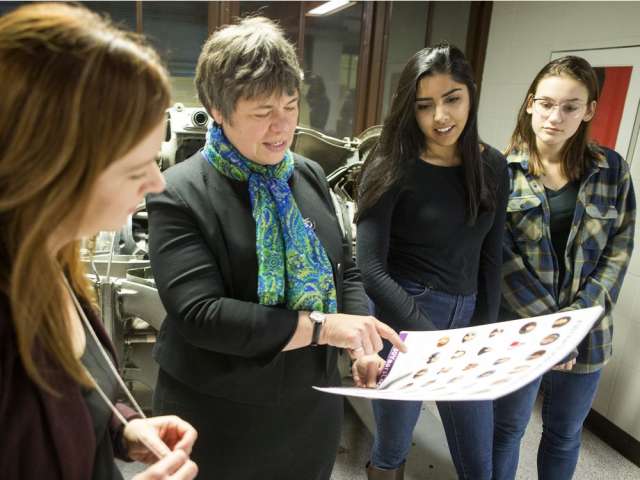
Kresta blazing trails at USask Engineering
Chemical engineer Dr. Suzanne Kresta became dean of the USask College of Engineering in January 2018. Read more in this article from the StarPhoenix's "Road to Higher Learning" feature.
By Elizabeth IrelandThe first woman to graduate from the University of Saskatchewan’s College of Engineering was Isobel "Izzy" Daw, in 1946. Today, approximately 20 per cent of undergraduates enrolled at the College of Engineering are women. In January 2018, chemical engineer Dr. Suzanne Kresta became the college's first female dean.
Over the past couple of years, the number of female faculty at the College of Engineering has increased from six out of 85, to 14 out of 91. Led by Engineers Canada, there is now a nation-wide initiative known as 30 by 30. The goal is to have women comprise 30 per cent of the Canadian engineering population (both academic and professional) by the year 2030. Increasing the number of female faculty in the college is a step toward meeting the 30 by 30 goal.
"There is fierce competition for female engineering faculty and it's a global market for talent. To more than double our female faculty in three years was not that easy. It was the right time to happen and creates a community that we can build on, as well as increasing an exchange of ideas and further incorporating a female voice," says Kresta.
Kresta is a strong advocate for women in the disciplines of science, technology, engineering and mathematics (STEM). She is thoughtful about the messaging young people need to hear about engineering. Yes, engineers are good at math and science but if you like to bake and cook – that's a type of chemical engineering as well.
In her own career, Kresta earned a BSc from the University of New Brunswick, an MSc from University of Leeds and a PhD from McMaster University. After living and working in different provinces, she doesn't express a regional affiliation and describes herself as "just Canadian." Kresta is an accomplished researcher in the area of turbulent mixing and she has worked in sectors ranging from drinking water systems to cosmetics to oilsands extraction.
With 2,236 students, the University of Saskatchewan College of Engineering is considered mid-sized among the 45 Canadian institutions with accredited engineering programs. The college offers undergraduate programs in eight different engineering disciplines, as well as master's and doctoral degrees.
Regarding the 30 by 30 initiative, Kresta explains, "Thirty per cent is a critical mass and a tipping point for sustainable female representation."
Kresta and her team at the College of Engineering are helping to create a more welcoming environment for female students, while staying mindful of not alienating the male student population. Kresta has two adult daughters of her own that are both professional engineers (P.Eng.). She spoke to her daughters candidly about attracting women to the profession and the need to be less gender-specific (for example, less comparisons to LEGO and cars). Kresta's one daughter, a mechanical engineer who now helps manufacture aircraft, was a keen quilter growing up.
Why should women consider entering the engineering profession? "Engineering jobs have regular hours and are well paid. There are a wide variety of roles and a set of skills that is more and more in demand. The need for engineers is well beyond big companies and industry. There are start-ups, essential services, health-care organizations, agriculture and food. An engineering career presents really diverse opportunities for a wide range of interests," says Kresta.
As a role model to future women engineers, Kresta says "the human aspect is what attracting me to engineering, being responsible for teams of people."
Kresta notes that while the college's environmental engineering program has the most females, disciplines such as mechanical engineering and electrical and computer engineering have taken longer to attract female students.
What is one message about engineering that Kresta would like to convey? "Engineers can do anything. There is a place for every kind of person in engineering."
Attentive to attracting females to the profession early, the college offers SCI-FI Science Camps for primary school children to explore science and technology. Each year, the U of S reaches more than 10,000 youth from across the province through school workshops, summer camps and Saturday science clubs.
Prospective College of Engineering students are encouraged to consult an academic advisor at the Engineering Student Centre and to come by for a tour. More information on the College of Engineering can be found at engineering.usask.ca.
This article was originally published in The Road to Higher Learning feature on February 26, 2020 in The Saskatoon StarPhoenix.

